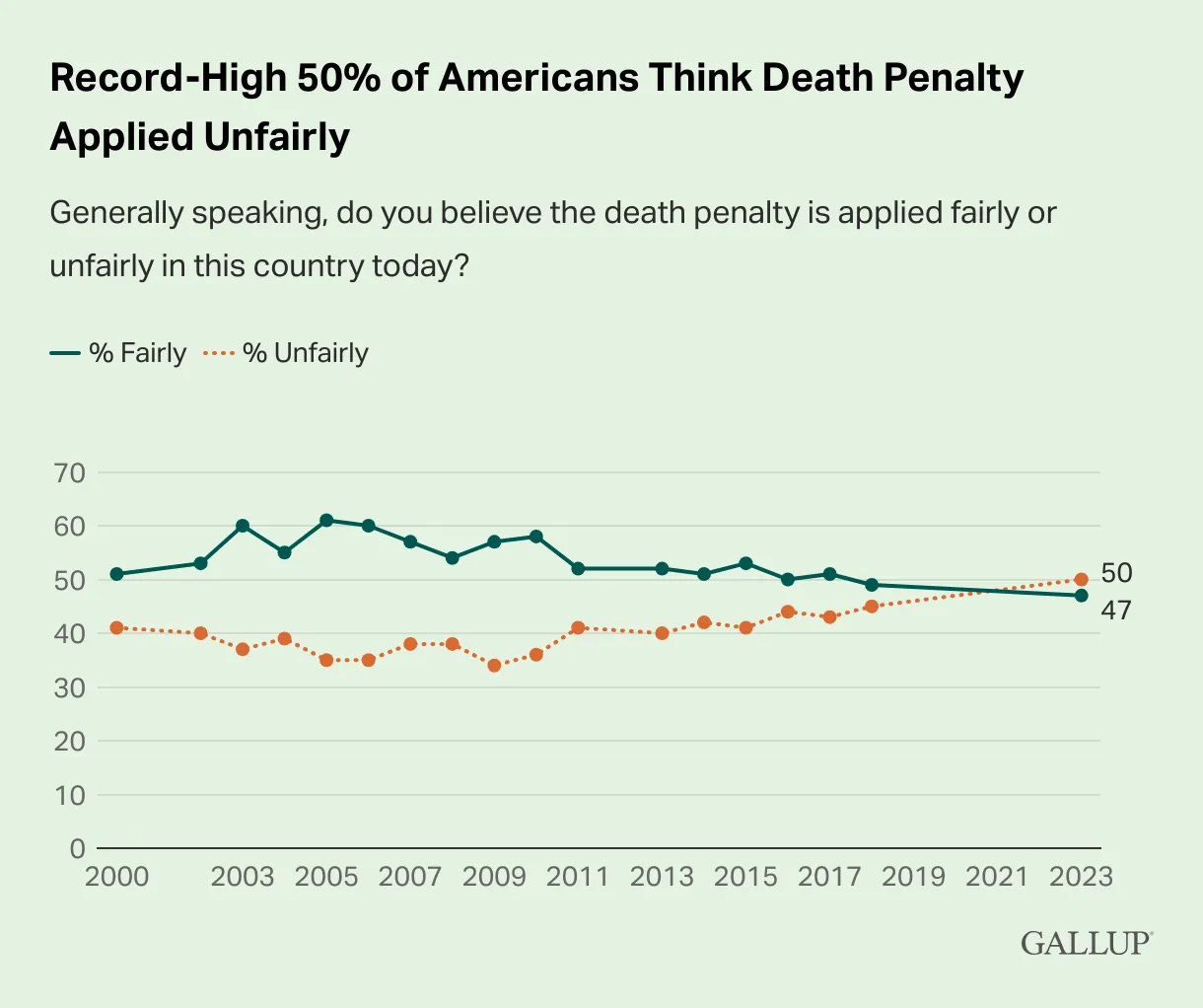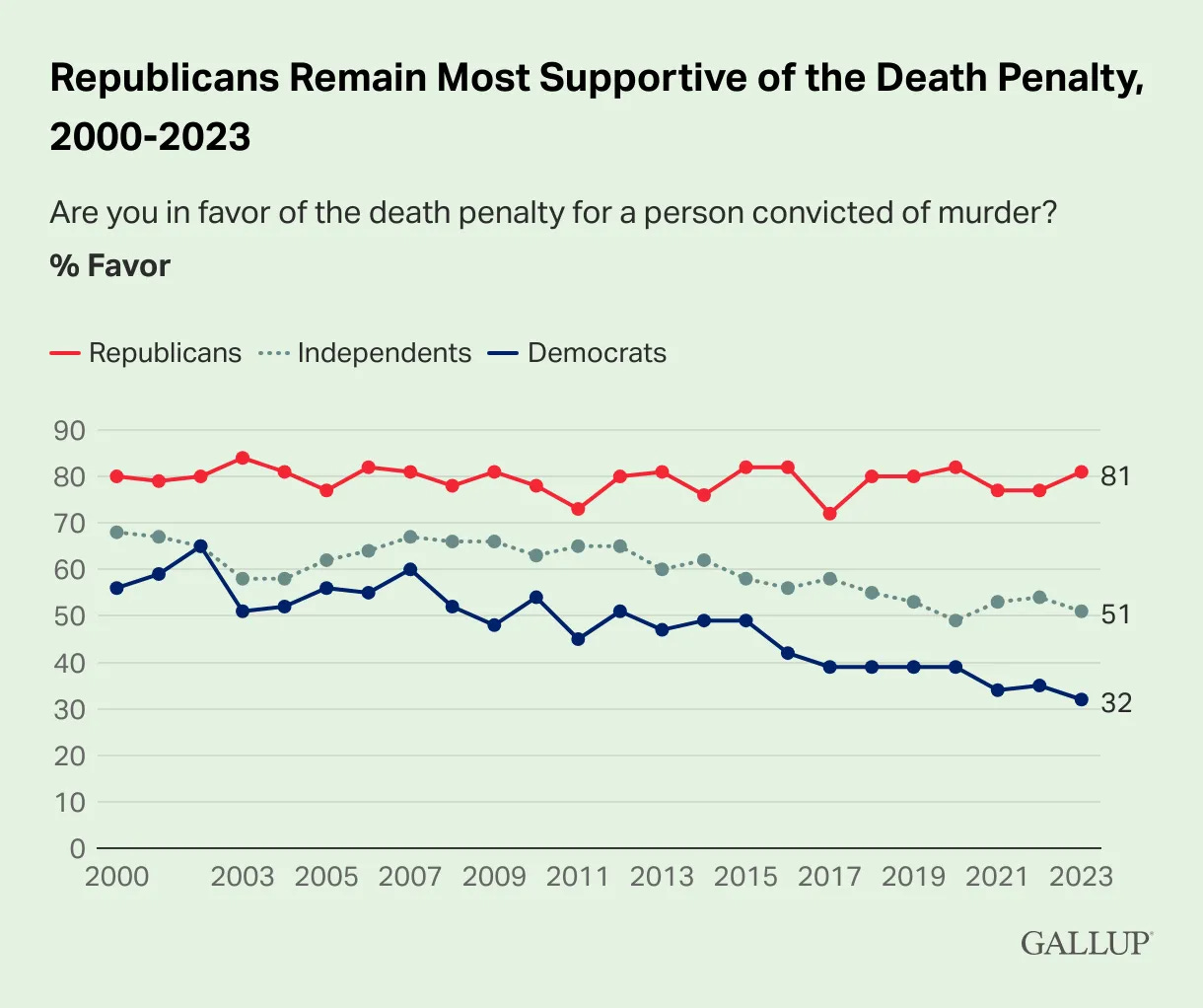Death Penalty Opponents Decry Dems Dropping Capital Punishment from Platform
Harris has waffled between supporting and opposing the death penalty. She's been silent on the issue since becoming the Democratic presidential nominee.
By Gary Gately
The Democratic Party’s decision to drop its opposition to the death penalty from its platform for the first time in two decades has drawn condemnation from opponents of capital punishment, who say it’s unjust and ineffective as a deterrent to crime.
“It feels like a real regression when the platform of the Democratic Party now excludes any goal of abolition of the death penalty,” Krisanne Vaillancourt Murphy, executive director of Catholic Mobilizing Network, which advocates for ending the death penalty, told The Catholic Observer. “The United States has to reckon with its addiction to the death penalty.”
This marks the first time since 2004 that the Democratic Party has not mentioned opposition to the death penalty in its platform and the first time since 2016 that the party’s platform has not called for abolition of capital punishment.
For his part, the Republican nominee, former President Donald Trump, has pledged to lift a Biden administration moratorium on the death penalty and expand capital punishment if elected. He has said he would target for capital punishment drug dealers and human traffickers.
Trump’s administration executed 13 people in a span of six months.
Hayden Laye, development director for the pro-life group Democrats For Life of America, said the group is “very disappointed to learn that the anti-death penalty plank was removed from the Democratic Party platform.”
“We progressed past the need for the death penalty in America long ago,” Laye said, adding that the group continues to urge President Joe Biden to commute the sentences of all federal death-row inmates.
“Democrats For Life stands firm in our opposition to the death penalty in every case,” Laye said.
Meanwhile, the American Civil Liberties Union said that if Vice President Kamala Harris is elected, the ACLU will immediately call on her to suspend federal executions, approve broad grants of clemency to inmates on federal death row and work toward abolition of the death penalty.
Harris did not mention the death penalty at the Democratic National Convention in Chicago last month and has not publicly mentioned it during her presidential campaign.
She had vowed as San Francisco district attorney never to seek the death penalty and rejected calls from fellow Democrats and police groups to seek the execution of a man accused of fatally shooting a police officer. But as California attorney general, Harris argued that the death penalty should stand. She then shifted her position again by stating her opposition to capital punishment while a U.S. senator and while campaigning for the Democratic presidential nomination in 2019.
Now, in the face of former President Donald Trump’s claim that she’s soft on crime, Harris has gone silent on the death penalty, to the chagrin of death penalty opponents, including some Democratic lawmakers. The Harris campaign did not respond to a request for comment.
“It feels like a real regression when the platform of the Democratic Party now excludes any goal of abolition of the death penalty. The United States has to reckon with its addiction to the death penalty.” — Krisanne Vaillancourt Murphy, executive director of Catholic Mobilizing Network
In 2020, then-candidate Biden posted on social media that he would propose legislation to abolish the death penalty at the federal level and offer states incentives to do so as well.
“Because we can’t ensure that we get these cases right every time, we must eliminate the death penalty,” Biden wrote.
Vaillancourt Murphy said that pledge heartened death penalty opponents after then-President Trump’s administration carried out 13 federal executions over the course of six months in 2020 and 2021 — the first federal executions in 17 years and the most under one president in more than a century.
Anti-death penalty advocates, however, point out that Biden, the nation’s second Catholic president, has reneged on his campaign promise to abolish the federal death penalty. His administration imposed a 2021 moratorium on federal executions while the Justice Department reviewed death penalty policies and procedures.
But Vaillancourt Murphy said the federal government continues to defend current death sentences, including those of Black men sentenced by all-white juries, those convicted based on flawed forensic evidence, those who are intellectually disabled or mentally ill, and those whose cases raise other serious constitutional issues.
The Justice Department did not respond to a request for comment.
Pope Francis revised the Catechism of the Catholic Church in 2018 to state that the death penalty is “inadmissible because it is an attack on the inviolability and dignity of the person.” The Catholic stance against the death penalty applies “even after the commission of very serious crimes,” the Catechism states.
This revision updated a 1997 Catechism version by Pope John Paul II that permitted the death penalty in rare cases where it was deemed “the only possible way of effectively defending human lives against the unjust aggressor.”
Francis has repeatedly called for abolition of the death penalty, including in the preface to a new book "A Christian on Death Row," by Dale Recinella, who has accompanied death row inmates in Florida prisons as a lay chaplain since 1998, alongside his wife, Susan.
“Capital executions, far from bringing justice, fuel a sense of revenge that becomes a dangerous poison for the body of our civil societies,” Francis wrote. “States should focus on allowing prisoners the opportunity to truly change their lives, rather than investing money and resources in their execution, as if they were human beings no longer worthy of living and to be disposed of.”
On Sunday, The New York Times published an editorial urging Biden to keep his campaign promise on the death penalty.
“It would be an appropriate and humane finale to his presidency for Mr. Biden to fulfill that pledge and try to eliminate the death penalty for federal crimes,” the editorial said. “Such an effort would also remind the nation that this practice is immoral, unconstitutional and useless as a deterrent to crime.”
The Times cited research the death penalty is applied arbitrarily, and disproportionately to Black people and people with mental illnesses. The editorial also pointed out that a death sentence condemns inmates to years of imprisonment, often in solitary confinement, and many executions have gone awry, subjecting inmates to excruciating pain, arguably violating the Eighth Amendment ban on “cruel and unusual punishment.”
“Until this year, the American justice system seemed firmly on course away from the death penalty,” the Times editorial said. “Mr. Biden was right to identify capital punishment as a moral affront, and he should help relegate this practice to history.”
While Trump has pledged to expand the federal death penalty if elected, a growing number of states have abolished it (23) or put moratoriums on executions (six) while 21 still have the death penalty on the books. And a November 2023 Gallup poll found that a record-high 50% of Americans think the death penalty is applied unfairly, and support for capital punishment fell to a five-decade low of 53%.
And since 1973, 200 death-row inmates have been exonerated, according to the Death Penalty Information Center.
Vaillancourt Murphy said she’s encouraged by the decline in support for the death penalty; the dramatic decrease in U.S. executions, down from 85 in 2000 to only 24 last year and 13 so far this year; and the Catholic Church’s “crystal clear” opposition to capital punishment.
“I think this is a time where we can make some really good headway, given what we know about the death penalty and all of its failures,” she said. “We’ve really made some extraordinary progress. So we feel emboldened by the work to continue educating and advocating and mobilizing and praying with Catholics around the country to stand for life and stand against this terrible system of death.”
Vaillancourt Murphy acknowledged that many Catholics remain unaware of Pope Francis’ revision to the Catechism emphatically ruling out the death penalty.
“This new language that the Church teaches in the context of the Gospel that the death penalty is an inadmissible attack on the viability and dignity of the person is something we kind of need to educate Catholics about,” she said.
She recalled visiting a Catholic church in New Hampshire over the summer that had outdated pamphlets on the death penalty that did not include Pope Francis’ revision to the Catechism.
“I can’t tell you how many times I’ve conversed with Catholics who don’t know the Church’s current teaching on the death penalty in respect to saving lives at every stage at every age no matter if you’re innocent or guilty.“
It’s shameful, Vaillancourt Murphy says, that the U.S. still executes people, when only two other modern democracies do: Japan and Taiwan. Capital punishment puts America in the company of countries including Iraq, Saudi Arabia, China and Russia.
“We need to honor the dignity of every life,” Vaillancourt Murphy said. “Everyone should be allowed a path toward redemption instead of practicing this revenge-driven, eye-for-an-eye mentality. As Pope Francis says, the death penalty eliminates all hope and any possibility for forgiveness and rehabilitation.”
Representing 22% of the U.S. population, she said, Catholics hold “significant moral influence capable of rousing public opposition to upcoming executions and even swaying legal outcomes in capital cases.”
“Simply put, Catholic pro-life witness has the potential to halt executions and save lives,” Vaillancourt Murphy said. “That’s why we’re harnessing the power of Catholic advocacy to speak out against every impending execution in the United States.”






It should be noted that Pope Francis change to the CCC regarding the death penalty is nothing more than his personal opinion and as such is in no way binding on conscience. Neither he, nor any pope, has the authority to change the perennial teaching of the Church on faith and/or morals. Rather it is their job to safeguard it. This in no way means that there aren’t grave moral issues with the application of the death penalty that are binding on conscience as taught by John Paul II. However Francis has overstepped his authority in this matter and his opinion can be seen as nothing more than his personal opinion which has confused people and led them astray.